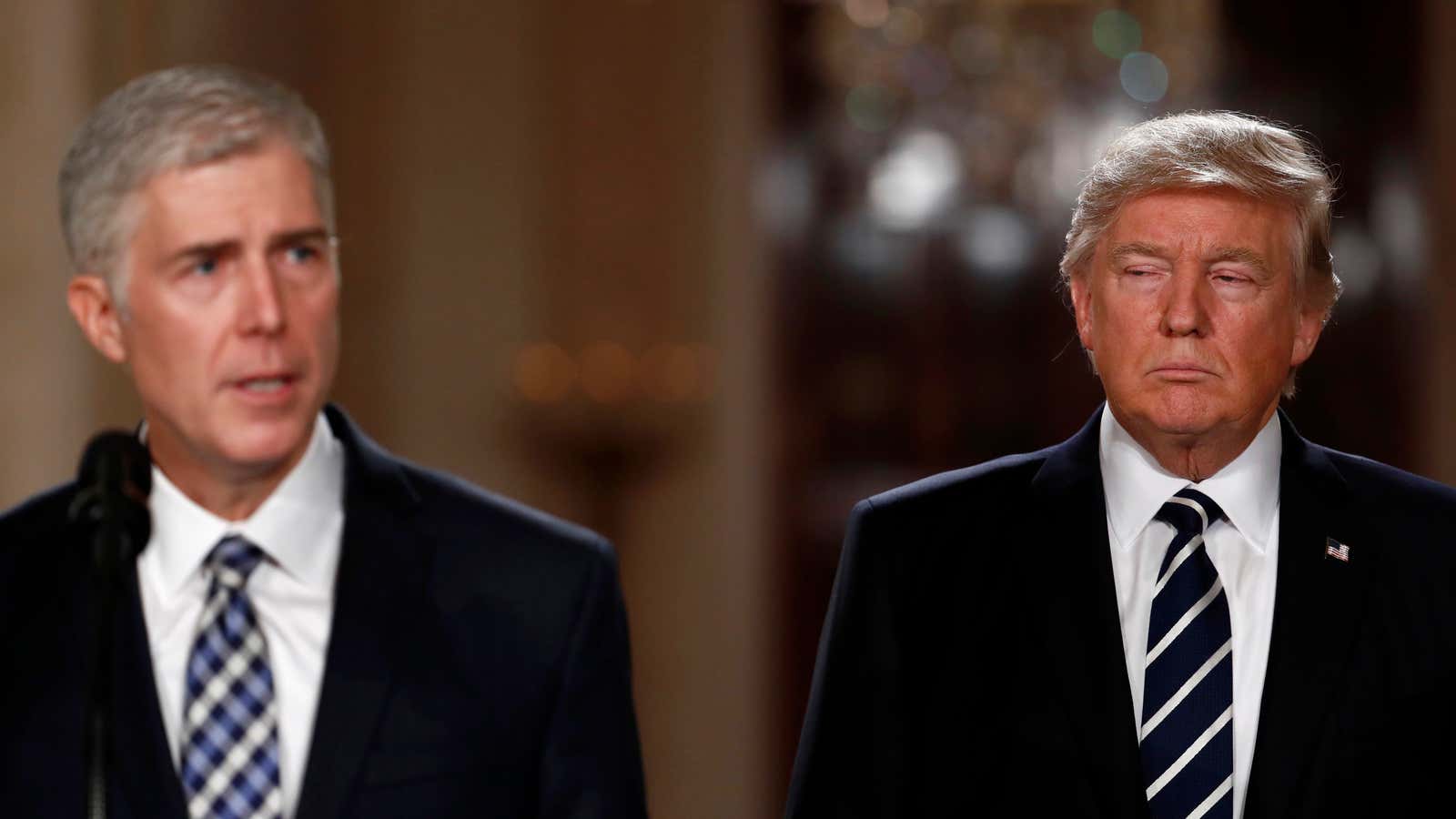Neil Gorsuch, president Donald Trump’s Supreme Court pick, was no fan of progressives as a young man. So derisive was he of “progressive” politics that he attacked the anti-apartheid movement during his student days.
As a student at Columbia University in the late 1980s, Gorsuch wrote extensively for the Columbia Spectator campus newspaper. Much has already been made of Gorsuch’s literary flair but more illuminating than his turn of phrase are the views he held as a young man, which become the foundation for some of the philosophies that have guided him on the bench.
In a Feb. 1987 essay “Overcoming a hegemony of ideas,” Gorsuch lays into the anti-apartheid divestment campaign by fellow students, which demanded that American companies stop investing in apartheid-era South Africa. Gorsuch was clear that he believed apartheid was an unjust and unacceptable system, but his views on the Columbia chapter of the anti-apartheid student movement were scathing.
Read today, Gorsuch’s early views on diversity on Columbia’s campus are worrying, describing diversity as “that cherished buzzword.” In his interpretation of on-campus diversity, Gorsuch strips the concept of all ideas of existing social privilege. Instead of a balance of voices, Gorsuch argues for all voices, irrespective of the moral weight one view may hold over another.
“What is lost in this self-righteous search for the purportedly ‘Moral Environment’ is the fact that no one has a monopoly on truth,” wrote Gorsuch, not even Nelson Mandela he added. “Only in an atmosphere where all voices are heard, where all moral-standards are openly and honestly discussed and debated, can the truth emerge.”
While his early dedication to a plurality of views is admirable, Gorsuch is unencumbered by personal biases that he may hold as he attacks Columbia’s divestment campaign for heavily relying on moral outrage. Instead, Gorsuch prefers a more clear-eyed assessment of the steps American companies had already taken in apartheid South Africa, and the contributions of companies like Coca-Cola and IBM to campus endowments. By that time, Columbia students had already made significant gains in lobbying for divestment, but Gorsuch fails to mention this.
Why don’t we hear arguments…that divesting from companies on their way out of South Africa is not productive? Is it because such arguments would be Immoral, False, and Heartless? Or is it because it is not fashionable at Columbia to be anything other than a pro-Sandinista, anti-Reagan, ADHOC, uranium-pilfering protester?
As a sophomore student in the late 1980s, Gorsuch laments a campus still stuck in the political sensibilities of the 1960s. He seems to finds himself at odds with campus activists who “remain solidly united behind certain policies they view as ‘moral’ and irrefutable.”
Gorsuch again went after the leaders of the divestment campaign in the Apr. 11, 1988 edition of the Spectator:
With a couple of illegible banners and cheers leftover from the divestment campaign (“Hey Columbia, have you heard, this is not Johannesburg”), they merely demonstrated the trivial nature of this spring’s “issues.”
The nod to Gil Scott-Heron aside, Gorsuch’s writes “[w]ith their ‘issues,’ campus ‘progressives’ have tried to convince us that we have an obligation to act.” Instead of trivialities like maintaining the divestment campaign, Gorsuch would rather the student body focused on campus election rules that are “swamp of bureaucratic pettiness.” That “swamp” got Gorsuch disqualified from the university senate race for unfair campaigning, according to a March 1986 edition of the Spectator. He makes no mention of this either.
It may seem unfair to go after the youthful views of a potential Supreme Court judge, but Gorsuch’s early conservatism has led to a rigid interpretation of the law and social issues today.
As a black South African who benefited from divestment campaigns and Columbia University’s dedication to diversity, I know that the issues Gorsuch dismisses are not simply topics for debate.
In a globalized world, domestic policy has a ripple effect on international relations. If Gorsuch is picked for the Supreme Court, he has at least 20 years of decisions ahead of him that will shape a country and by virtue of the America’s geopolitical might, will set the tone for global issues.
